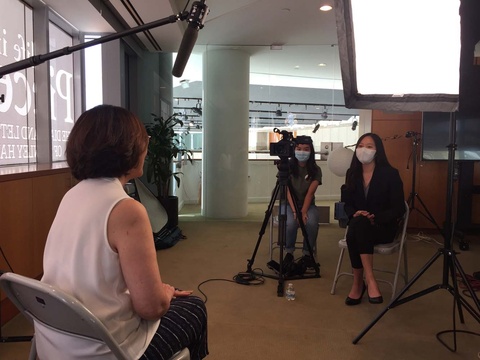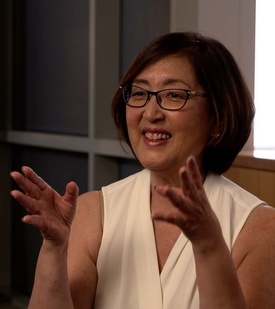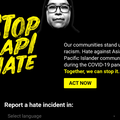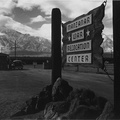On July 24, 2021, I had the privilege of interviewing Ms. Patricia Kinaga: an attorney, activist, and mother. From previous research, I had learned that she is an incredible woman who has achieved great things as an attorney. However, stepping away from the interview, I learned so much more beyond that. I was able to see a glimpse into her life, her past, and her experiences through the stories she told me. She explained how everything made her feel, from the passion in her heart to the satisfaction of being able to help thousands of people. I learned things that one cannot gain by simply googling someone. I am truly honored to have been able to sit down and listen to Ms. Kinaga’s stories and want to share them with the world in hopes that her story can inspire many more as it has inspired and touched me.
Kinaga grew up in Los Angeles, California where she attended Palos Verdes High School. Soon after, she got her bachelor’s degree from UCLA, earned her masters from UC Berkeley, and got her Juris Doctor from Georgetown University in Washington, DC. Her parents and grandparents were both forced into incarceration camps, which helped spark a passion for law within her. She explains that knowing that hundreds of thousands of Japanese Americans had their civil rights stripped from them and were forced behind barbed wires, she wanted to take on a career in law, not to make more money, but to “affect social change”.
She first became a prosecutor because her father volunteered from the incarceration camps to serve in the 442nd Regimental Combat Team, so she gravitated toward wanting to help victims achieve justice. She mainly focused on domestic violence within the Asian community because of her drive to help people who do not have a voice. However, she then moved to employment law. Her cousin’s husband had once told her that in order to make big social changes, there must be people on the inside. He stated that he worked for a legal aid clinic and was trying to affect social change from the outside as a civil rights activist, which sometimes is not as effective as someone making changes from the inside.
At this point, Kinaga realized that perhaps she should work for a private law firm and fight for reform from the inside out. She is now a very successful defense attorney in employment law helping companies create sexual harassment policies and complete other various policy changes.
Throughout Kinaga’s lifetime, she has earned numerous awards, co-founded several successful organizations, and accomplished so much for her community. Throughout her busy career she managed to create several films to raise awareness for topics such as domestic violence and breast cancer among Asian women. These films have affected so many people for the better, with one of them even being nominated for an Emmy award. She also co-founded several organizations such as the Asians and Pacific Islanders With Disabilities of California and the Asian American Dispute Resolution Center. She was also the first Asian American woman to be a partner at two different law firms. For all of her achievements and community work, both as an activist and an attorney, Kinaga has won the Berkeley Peter E. Haas Public Service Award, 2018 Woman of the Year Award, and several other public and community service awards. Kinaga has already created such a positive impact in her community, but the inspirational messages that she has to share with the world are ones that will stick with people and inspire them for years to come.
The first message that Kinaga had shared with me is that we must fight to give voices to those who do not have one. Throughout her life, she has dedicated herself to achieving justice for those who may be too afraid to speak out or aren’t heard when they do. The main areas she focused on were domestic violence in the Asian community, reproductive health rights for Asian women, breast cancer among Asian women, and Asians with disabilities. The area that really stood out to me was her influence in helping survivors of domestic violence. As a prosecutor focusing in this area, Kinaga was able to meet many Asian Pacific Islanders who were victims of domestic violence. She states that she realized that “they were so hesitant to come forward for many different reasons.” Many survivors of domestic violence were extremely scared to come out and talk about their experiences, especially during this time when domestic violence was just coming out as a reality. Kinaga also mentioned that she would witness Asian ministers at the courtroom speaking with the victims. When she would ask interpreters who these men were and what they were saying, as many of her cases involved people who did not speak English, she found out that they were trying to convince the victims to not go through with the case.
According to Kinaga, they would tell the victims that they “should think twice about cooperating with the prosecution and testifying against their batterers (meaning their husbands) because it was against the Bible, because the Bible teaches to keep the family intact.” Seeing how hesitant Asian women were to go through with the trial due to their various reasons, Kinaga decided to create a film to raise awareness for domestic violence as well as provide support and resources for survivors of domestic violence.
The responses she received from her Emmy-nominated film were so touching. The film was initially aired with an 800 phone number scrolled at the bottom of the screen. The phone calls were then routed to the television studio, staffed by therapists, attorneys, and members of the clergy. The studio received hundreds of calls thanking them for the film. Some admitted that they were too terrified to speak out, but that this film helped them do so. One call Kinaga received was from a man who admitted that he beat his girlfriend, but that he is committed to doing it no more. Another call that stuck with her was when a woman called and was whispering to her out of fear and said, “Thank you because I think I can do it now. I think I can report it.” Just hearing the feedback from the film really touched my heart. This film created by Kinaga and her team helped thousands of people all over the world reach out for help to achieve justice as well as safety for themselves.
Although Kinaga’s film was groundbreaking, she mentioned that she had never created a film before, so turning her idea into a reality was at first, pretty difficult. This brings me to the next message I retained from my interview with her: when you have a passion for something in your gut, you will find a way. When Kinaga first thought about this idea of creating a film on domestic violence, she didn’t have a crew, filming equipment, or previous film experience. So the first thing that she had to do was gather up a team of people to help her. In order to do so, she posted an article in the newspaper explaining the idea of her film and how she needed volunteer crew members to help her go through with this idea. She told me that she soon got flooded with headshots and people eager to volunteer to help with this film. From there, they reached out to many people for equipment. Through cold calls, they got their film and equipment from huge companies such as Eastman Kodak and Warner Brothers. However, this process was not easy, as they faced many obstacles. It was through their determination, passion, and perseverance did they make this film possible. In the end, her film was nominated for an Emmy and has helped thousands of people around the world.
She now enjoys creating films about various other topics such as breast cancer in the Asian community and the 442nd Regimental Combat Team, the segregated Japanese American infantry which fought valiantly during WWII to prove their loyalty as Americans. The impact that she has had on the world all started with one idea, and even though she didn’t have the necessary equipment or support that she needed in the beginning, through lots of hard work and with the help of many friends, she was able to save many people from domestic violence and other serious issues.
When I asked Kinaga what she believed was the most difficult challenge that she has faced being an attorney, activist, and mother, she told me that it was being able to balance everything. One of the last main messages that I want to share with everyone that I had learned from her is that it is extremely important to balance different aspects of your life with your family.
One very important trial that Kinaga was put on required her to work incredible hours. She would be up at 4:30 a.m. and leave the office around midnight. As a result, she was unable to spend much time with her toddler daughter, Emily, and her young son, Brandon. One early morning, after Kinaga finished showering, she heard a little voice. When she walked out, her daughter had her arms stretched up toward her and was saying, “Mommy dakko”, which means something similar to, “Mommy, please pick me up.” Ms. Kinaga explained to me that it was at this moment that she knew that, “in order to be a successful mother, [she] needed to clearly have the time [she] was going to spend with Emily and Brandon.”
She explains how she cut down on her community work a bit at that time in order to spend more time with her children. She reserved specific times in her day to spend time with her family. However, she didn’t cut her community activity totally out of her life, as she would bring her children to political fundraisers and community events. Her children seemed to enjoy going to these events and have grown up to become activists themselves.
Kinaga states that not only is her husband and children supportive of the work that she does, but they are also involved in it. Her passion for justice and activism has not only positively affected her community, but has also been passed down through her children for future generations. Lastly, Kinaga stressed how grateful she is to the many friends and strangers who have assisted her in the various projects she has been involved in.
I am so honored that I was able to interview Ms. Patricia Kinaga, as I have learned so much from just a single conversation with her. Her passion for helping those without a voice really stuck with me. I have been extremely fortunate in life to grow up in a loving family, with a great community of people, and having a good education. I want to be able to use the skills I have obtained over the years in order to help those who have not been as fortunate as me and to represent them through law. Kinaga’s message about how if you have a true passion in your gut, then you will find a way to get it done, gave me hope that if I truly pour my heart and soul into becoming an attorney and fighting for justice, I will find a way to do so no matter the obstacles I may face.
Lastly, I really enjoyed hearing about how Kinaga was able to balance out being a successful attorney, activist, and mother at the same time. I have often thought about how I would be able to balance both my career and family once I have children in the future. I want to help as many people as I can through law and activism while still being able to spend time with and raise my future children. Family means everything to me, so I was really worried about how I would be able to balance family with work. However, hearing how Kinaga, although challenging at times, was able to successfully balance her family and her career, I have hope that I can too with the support of my friends and loved ones. I am so inspired by Kinaga’s stories and messages and hope that by sharing her stories with more people, she can continue to inspire people from around the world.
* * * * *
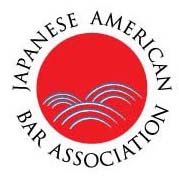
The Japanese American Bar Association (JABA) Legacy Project creates profiles of prominent jurists, legal legends and leaders in the Japanese American community through written articles and oral histories. In particular, these profiles pay special attention to these pioneering jurists’ reflections on JABA, their distinguished careers, and their involvement in the Japanese American community.
This is one of the main projects completed by The Nikkei Community Internship (NCI) Program intern each summer, which the Japanese American Bar Association and the Japanese American National Museum have co-hosted.
Check out other JABA Legacy Project articles published by past NCI interns:
- Series: Pioneering Jurists in the Nikkei Community by Lawrence Lan (2012)
- Series: Legal Legends in the Nikkei Community by Sean Hamamoto (2013)
- Series: Two Generations of Pioneering Judges in the Nikkei Community by Sakura Kato (2014)
- “Judge Holly J. Fujie—An Inspirational Woman Who Was Herself Inspired by Japanese American History and Community” by Kayla Tanaka (2019)
- “Mia Yamamoto—A Leader Who Defined the Nikkei Community” by Matthew Saito (2020)
- “Justice Sabrina McKenna—The First Openly LGBTQ Asian American to Serve on a State Court of Last Resort” by Lana Kobayashi (2022)
© 2021 Laura Kato


